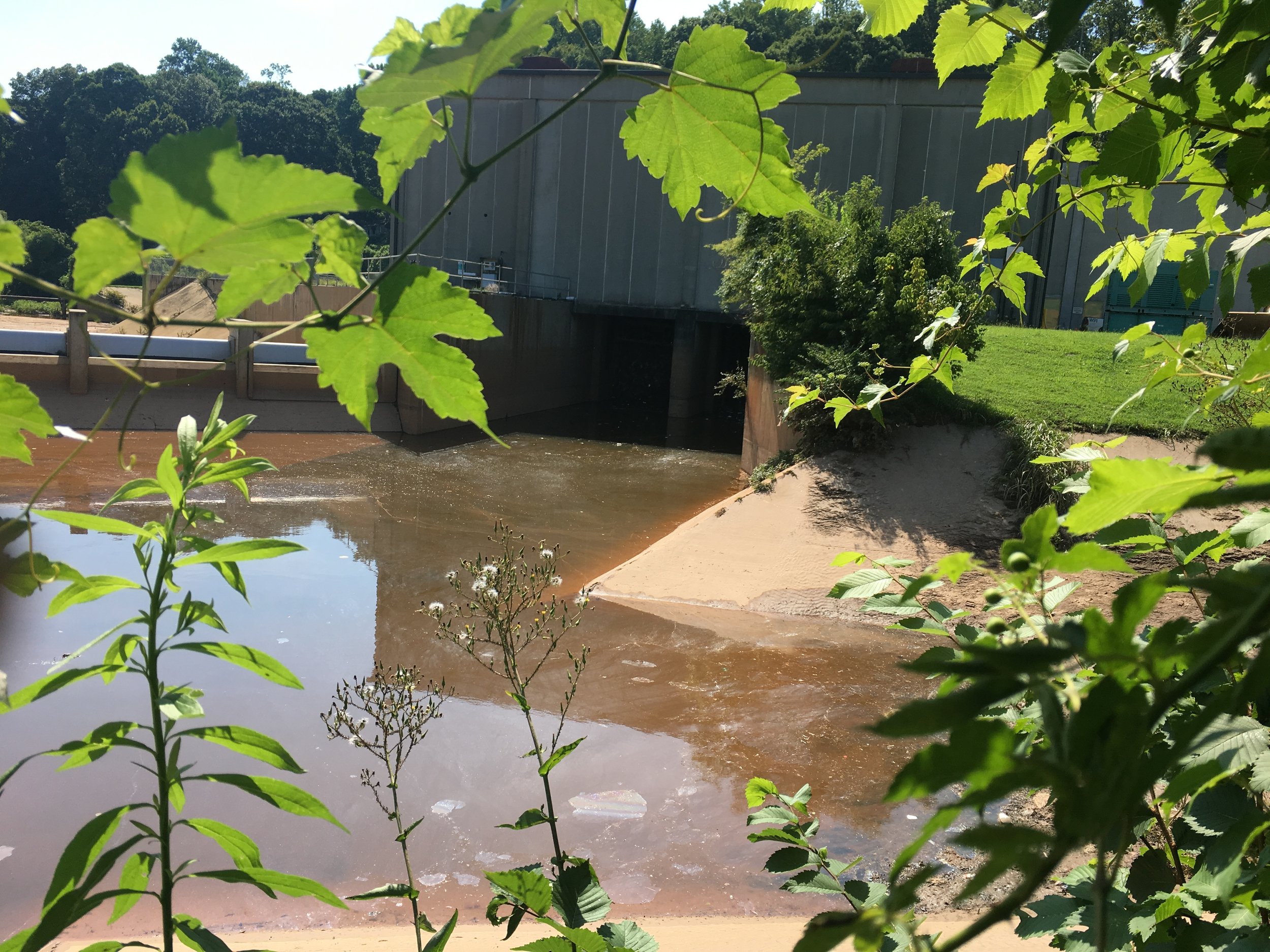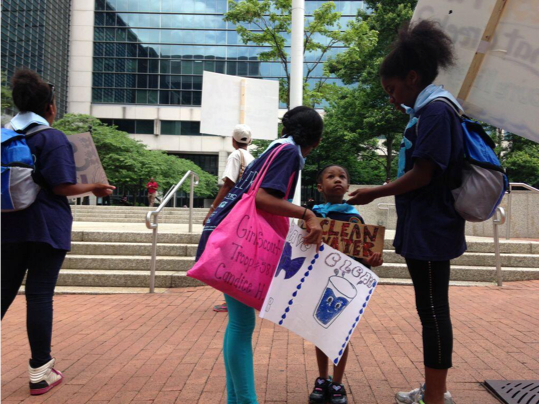Managing the South River as a valuable natural resource requires tackling numerous threats to its ecology INCLUDING:
Ecological Threats
Water Quality
Regulatory Enforcement
Environmental Justice & Achieving Better Water Quality presented by Board President, Dr. Jacqueline Echols. Start at 6:40
– 1 –
Ecological Threats
POLLUTION • stormwater • withdrawal • sedimentation
Like most urban rivers, the South River has been highly degraded due to a variety of eco-threats. It is critical that all stakeholders – municipalities, the EPA, Georgia EPD, businesses, and citizens – hold each other accountable to actively address these issues.
POINT SOURCE POLLUTION (PSP)
Point source pollution (PSP) is the biggest threat to the South River. Typically, PSP can be traced to a specific discharge facility or pipe that empties directly into a waterway. Since the 1972 U.S. Clean Water Act, many sources of this kind have been eliminated or their impact reduced by means of enforcement of wastewater permits that stipulate how much pollution can be discharged.
PSP contaminates the South River at City of Atlanta’s Custer Ave combined sewer overflow (CSO) facility on Entrenchment Creek and via DeKalb County’s perpetual sewer spills which have resulted in millions of gallons of untreated sewage in the river. DeKalb has failed to invest in significant sewer infrastructure improvements while environmental regulators (US EPA and GA EPD) have failed to enforce the federal consent decree issued to DeKalb County in 2011.
Sanitary and combined sewage pollution are regulated under the U.S. Clean Water Act and other federal and state regulations. Effective enforcement by EPA and Georgia EPD is critical to eliminating unnecessary pollution.
NON-POINT SOURCE POLLUTION (NPS)
Non-point source (NPS) pollutants cannot be linked to a specific source. Examples include trash, fertilizer, chemical and petroleum products, pesticides, and heavy metals. When it rains, stormwater washes pollutants into the nearest waterway. Impervious surfaces (surfaces that absorb little or no water such as concrete, pavement, buildings) increase the volume and velocity of runoff and stormwater pollution. With increasing development and insufficient stormwater management, NPS pollution has escalated dramatically.
NPS pollutants degrade the ecology in different ways. Fertilizers, for example, contain ammonia that causes algae blooms, suffocating the ecology. Pesticides make water unsafe for wildlife, and trash destroys aquatic habitats.
Trash removal is a major part of SRWA’s river restoration strategy. In 2019, a Bandalong Litter Trap (a mechanism that corrals trash for removal) was funded by DeKalb County and is to be installed at Snapfinger Water Treatment Facility in 2022.
POINT SOURCE: CUSTER AVE COMBINED SEWER OVERFLOW facilit
Y
The federal National Pollutants Elimination System (NPDES) permit for City of Atlanta’s Custer Avenue CSO facility requires that wastewater discharge must not degrade water quality in Intrenchment Creek. SRWA monitors GA EPD’s enforcement of the NPDES permit.
Hold polluters accountable. Your voice matters.
STORMWATER RUNOFF
Stormwater runoff is a form of NPS pollution which is given specific attention due to the gravity of the problem and its damaging effect. This rapid, high volume rainwater runoff is common in urbanized areas where trees, soils and greenspace have been replaced by pavement and buildings (impervious surfaces). Impervious surfaces absorb little to no water and block the natural processes that help rainwater slow down and filter pollutants by soaking into the ground. As a result, tremendous amounts of polluted water rushes into the nearest creek causing erosion and scouring so severe that only large rocks and red clay remain.
Runoff can elevate water temperatures making conditions uninhabitable for amphibians and temperature-sensitive fish, while scouring and erosion destroy aquatic habitats and introduce harmful sediment and pollution.
Runoff increases the chance of flash floods and property damage. Like other NPS pollution, it increases with development. Regulations, enforcement and best practices that reduce impervious surface and protect trees and soil are needed, including stronger stream buffer protections.
WATER WITHDRAWAL
Georgia law allows for withdrawal of 100,000 gallons of water per day without a permit and no monitoring. For this reason, permits are critical to the protection of in-stream flows, aquatic habitat, and water quality. Unchecked withdrawals have devastating impacts on the South River in particular, due to its size and base flow, particularly during dry weather. Georgia’s multi-year droughts greatly reduce the rivers flow, particularly in the upper reaches where tributaries are small.
The vast majority of water withdrawal from the South River is not replenished. For example, Sugar Creek Golf and Tennis Center in DeKalb County consistently removes the maximum daily withdrawal for irrigation purposes, but virtually none of the water is returned to the river. Returning water to its source is critical to maintaining adequate flow for the survival of aquatic life.
In 1998, the Upper Chattahoochee Riverkeeper secured a precedent-setting judicial decision regarding the legal standing of public interest groups, such as SRWA, to challenge water withdrawal permits. SRWA regularly monitors proposed withdrawal permits and permit modifications in the South River watershed.
SEDIMENTATION
Construction sites and deforestation are the most common source of sediment pollution. When rain hits disturbed land surfaces, sediment pours into the closest waterway. Sand and dirt accumulate and massive erosion occurs.
Sediment decimates aquatic and arboreal (tree) habitat. It suffocates gill-breathing organisms, smothers eggs, destroys spawning sites, eliminates critical shelter, and depletes food sources. Sedimentation also impedes recreational access, increases the cost of water treatment, and reduces property values.
– 2 –
Water Quality
DESIGNATED USE
– According to the EPA –
The "Designated Use” of a water body is an expression of goals, such as supporting aquatic life and human activities. That is, these goals may not currently be attained. Designated Use:
• Articulates the vision for the water body
• Establishes water quality goals
• Therefore, if the designation is wrong, everything else is wrong
GA EPD is responsible for enforcing wastewater permits, legal actions, and regulations that are meant to effectively limit the amount of pollution that enters our waterways. GA EPD is responsible for ensuring that the South River meets and maintains the water quality standards of its designated use of Fishing.
Failure of GA EPD to carry out this responsibility is the main reason the South River has not experienced sustained improvement in water quality. Water quality is most degraded by pollution from the City of Atlanta combined sewer system and DeKalb County sanitary sewage spills. If these two preventable sources of pollution were eliminated, or at least effectively managed, water quality in the South River would improve.
The South River’s designated use classification of Fishing denotes human consumption, has implications for public health and presumes an ecology that supports aquatic life. However, in Georgia Fishing is the default use classification with the lowest water quality standards. Fishing offers the least protection and allows for the highest levels of pollution.
An upgrade to Recreation, the next tier of designated use, would require GA EPD to write and enforce wastewater permits and reduce allowable levels of pollution to meet higher water quality standards. Designated use of Recreation paired with regulatory enforcement would make restoration of the South River possible.
– 3 –
Regulatory Enforcement
The stated purpose of the U.S. Clean Water Act (CWA) is to protect human health and the environment. Responsibility for implementing the CWA in Georgia is delegated to the GA EPD by the U.S. EPA. Water quality in the South River and all of the its primary creek tributaries in City of Atlanta and DeKalb County do meet water quality standards. Many do not support aquatic life altogether.
Managing water as a resource requires that we actively promote clean water and view water as having intrinsic value.
The solution to pollution is not dilution. Nature is resilient. Its ability to bounce-back is amazing. But the state of degradation in our waterways requires that we manage water as a resource in order to achieve restoration. Managing water means enforcing regulations that require local governments and businesses to meet permit requirements, fix leaky sewer pipes, and control stormwater runoff.
People and the natural environment must be viewed as having interests worthy of protection. To restore and protect our watershed, this principle must be applied to enforcement.
Our work is strategic to achieving ecological restoration of the South River. Your donation makes a difference.




